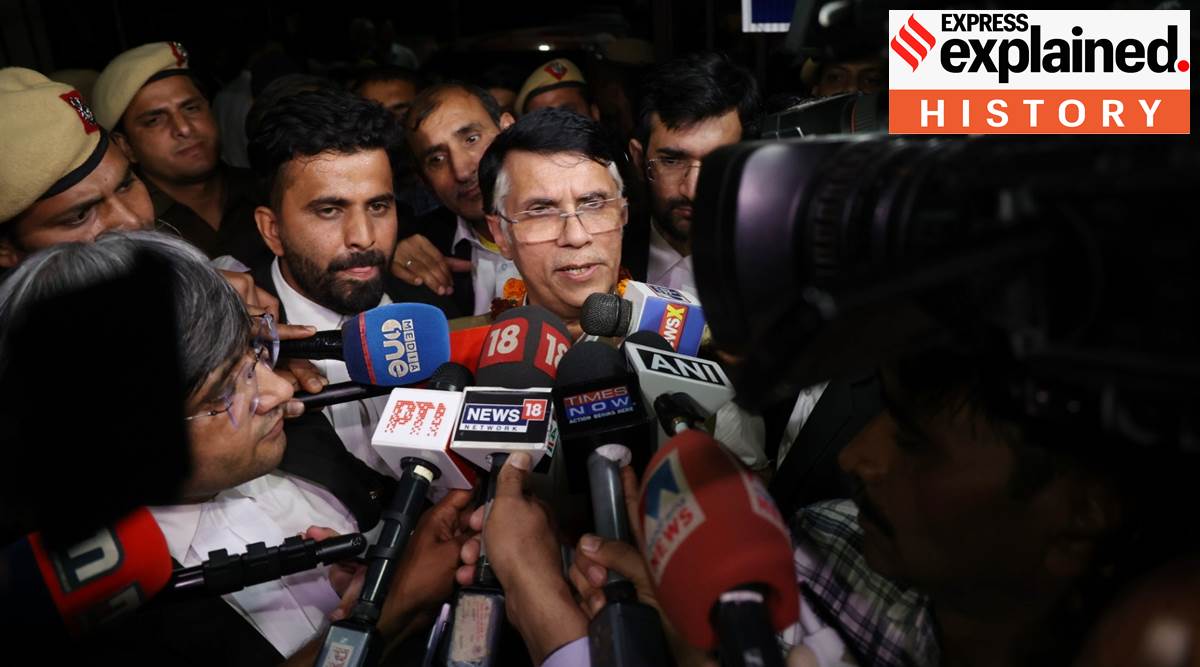
The invocation of these laws are often criticised for restricting free speech and misusing the legal processes for political purposes.
Section 153A: What the law says
Section 153A of the Indian Penal Code (IPC) penalises “promoting enmity between different groups on grounds of religion, race, place of birth, residence, language, etc., and doing acts prejudicial to maintenance of harmony”. This is punishable with imprisonment up to three years, or with fine, or with both.
The provision was enacted in 1898 and was not in the original penal code. At the time of the amendment, promoting class hatred was a part of the English law of sedition, but was not included in the Indian law.
In the pre-Independence Rangila Rasool case, the Punjab High Court had acquitted the Hindu publisher of a tract that had made disparaging remarks about the private life of the Prophet, and had been charged under Section 153A.
In his book Offend, Shock or Disturb: Free Speech Under the Indian Constitution, lawyer Gautam Bhatia wrote that the High Court distinguished between an attack on a community and an attack on a deceased leader of that community. When a similar piece was published again, the HC held that “a scurrilous and foul attack on a religious leader would prima facie fall under Section 153A — although not every criticism”.
Story continues below this ad
Along with Section 153A, Section 505, which penalises “statements conducing to public mischief” was also introduced. In his 2016 paper, legal scholar Siddharth Narrain noted that the provision was introduced to “change the existing provision dealing with circulating mischievous reports to shift the burden of proving the truth to the accused”. (Hate Speech, Hurt Sentiment, and the (Im)Possibility of Free Speech)
In 1969, the offence was widely amended to enlarge its scope to prevent communal tensions. In the same amendment, the offence was also made cognisable, which means a police officer can make an arrest without a warrant.
The FIR against Khera also mentioned Section 153B(1) (Making imputations, assertions prejudicial to national integration); 295A (Deliberate and malicious acts, intended to outrage religious feelings of any class by insulting its religion or religious beliefs); 500 (Defamation); and 504 (Intentional insult with intent to provoke breach of the peace).
The application of the law
Hate speech laws have been invoked under regimes of all parties to crack down on criticism of public functionaries and to arrest individuals.
Story continues below this ad
In May last year, Marathi actor Ketaki Chitale was arrested for a Facebook post allegedly defaming NCP leader Sharad Pawar. She was booked under the same provisions in as many as 22 FIRs.
And in March 2022, BJP youth leader Arul Prasad was arrested by the Tamil Nadu Police for spreading “defamatory information” about Chief Minister M K Stalin under the same provisions.
Data from the National Crime Records Bureau (NCRB) show that the rate of conviction for Section 153A is very low.
In 2020, 1,804 cases were registered, six times higher than the 323 cases in 2014. However, the conviction rate in 2020 was 20.2%, suggesting that the process often becomes the punishment.
Story continues below this ad
The registration of multiple FIRs across different states drains the resources of the accused to secure legal representation. The accused has to move the Supreme Court seeking clubbing of the FIRs if the FIRs relate to one event. This is what Khera sought.
 Congress leaders stage a protest dharna at the IGI Airport after the party leader Pawan Khera was allegedly deboarded from the plane owing to an FIR against him, in New Delhi, Thursday, Feb. 23, 2023. (PTI Photo)
Congress leaders stage a protest dharna at the IGI Airport after the party leader Pawan Khera was allegedly deboarded from the plane owing to an FIR against him, in New Delhi, Thursday, Feb. 23, 2023. (PTI Photo)
Safeguards against misuse
Given that the provisions are worded broadly, there are safeguards against its misuse. For example, Sections 153A and 153B require prior sanction from the government for initiating prosecution. But this is required before the trial begins, and not at the stage of preliminary investigation.
To curb indiscriminate arrests, the Supreme Court laid down a set of guidelines in its 2014 ruling in Arnesh Kumar v State of Bihar. As per the guidelines, for offences that carry a sentence of less than seven years, the police cannot automatically arrest an accused before investigation.
In a 2021 ruling, the SC said that the state will have to prove intent for securing a conviction under Section 153A. The SC in this case quashed an FIR against the editor of The Shillong Times, Patricia Mukhim, registered for allegedly creating communal disharmony through a Facebook post.
Story continues below this ad
“The intention to cause disorder or incite people to violence is the sine qua non of the offence under Section 153A IPC and the prosecution has to prove the existence of mens rea in order to succeed,” the SC stated.
“Words used in the alleged criminal speech should be judged from the standards of reasonable, strong-minded, firm and courageous men, and not those of weak and vacillating minds, nor of those who scent danger in every hostile point of view. The standard of an ordinary reasonable man or as they say in English law “the man on the top of a Clapham omnibus” should be applied,” the court said.
Following his release on interim bail, Khera said that he was “grateful” to the Supreme Court for upholding his liberties. Accusing Assam Police of arresting him “illegally without serving any notice”, Khera said, “The law came to my rescue… Am I a terrorist? Why did they deplane me? I’m fighting for my country, my rights as a citizen, our Constitution…”
However, the SC, while releasing him on interim bail “in order to protect the petitioner until such date as he applies for regular bail before the jurisdictional court upon the FIRs being transferred to one and the same jurisdiction”, made clear its disillusionment over the words used by Khera against Prime Minister Narendra Modi.
Story continues below this ad
It told Senior Advocate A M Singhvi, who appeared for Khera: “Mr Singhvi, we will protect you. But there has to be some level of discourse…”.



 Congress leaders stage a protest dharna at the IGI Airport after the party leader Pawan Khera was allegedly deboarded from the plane owing to an FIR against him, in New Delhi, Thursday, Feb. 23, 2023. (PTI Photo)
Congress leaders stage a protest dharna at the IGI Airport after the party leader Pawan Khera was allegedly deboarded from the plane owing to an FIR against him, in New Delhi, Thursday, Feb. 23, 2023. (PTI Photo)




































